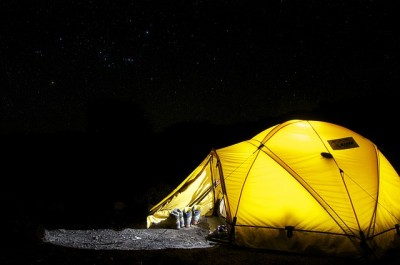Swp57
Doomsday Survival Blog
- Messages
- 55
Off-grid living is slowly and methodically being regulated out of existence by many local governments throughout the United States and Canada, an Off The Grid News analysis has found.
Although there certainly are places where living off the gird is perfectly legal, there also are quite a few locations in America and Canada where zoning regulations, building codes and other local ordinances are driving those who wish to live off the grid out of many communities.
OTGN examined laws and news stories from across North America and discovered glaring examples of government regulation:
1. Livestock regulations.
The city of Visalia, California, threatened Gingi Freeman with a $1,000-a-day fine for keeping two Nigerian Dwarf Goats – which are the size of small or medium-sized dogs — in her yard. Freeman used the goats to provide milk for her babies. The mother of two is unable to produce breast milk because of surgery she had as a teenager.
“My only options were to use formula or get breast milk from donors. There have been a couple times where we ran out of breast milk donations,” Freeman said.
Elsewhere, animal control officers seized three pygmy goats and six chickens from Dave and Sky Brown’s urban farm in the largely deserted Riverdale, Michigan, neighborhood in 2014. The officers were accompanied by police.
The animals were taken in an effort to enforce an ordinance against unlawful farm animals. At the time of the seizure, Sky Brown was worried that the animals could be killed by authorities.
The Browns were particularly upset because an animal control officer used a net to catch the chickens before they were put in crates and taken away.
“There are gun shots every night,” Brown wrote of her neighborhood. “There are meth addicts blowing up houses within blocks of us, and the city of Detroit finds it more relevant to rip screaming pets out of the hands of their devastated owners.”

Disturbingly, it could be illegal to keep livestock even on rural property in some parts of Michigan. The state’s Commission of Agriculture and Rural Development ruled in 2014 that local governments have the right to ban livestock from any area zoned residential. That would include subdivisions outside the city limits.
The action will “effectively remove Right to Farm Act protection for many urban and suburban backyard farmers raising small numbers of animals,” Gail Philbin of the Michigan Sierra Club told Michigan Live. The Right to Farm Act is a state law that protects farmers from nuisance lawsuits and zoning regulations.
Here’s just a small glimpse of what you’ll find in The Lost SuperFoods:
The US Army’s Forgotten Food Miracle And 126 Superfoods That You Can Store Without Refrigeration for Years
Watch the video below!

2. Utility regulations.
Simply refusing to connect to utilities is now illegal and punishable by fines or even evictions in many places. Some people have been told they cannot live in their own homes because they refuse to connect to utilities.
Robin Speronis of Cape Coral, Florida, was evicted from her own home by city officials. Her offense: She was not hooked up to the city’s water system. Speronis was cited by a code enforcement officer after she told a local television that she was living without utilities. Interestingly, city officials admitted that Speronis did not have to use the water simply; she simply needed to be connected. Even the magistrate who initially upheld Speronis’ conviction acknowledged that the case was irrational.
“Reasonableness and code requirements don’t always go hand-in-hand … given societal and technical changes (that) requires review of code ordinances,” Special Magistrate Harold S. Eskin said.
Speronis was not alone. Officials in Clark’s Harbour, Nova Scotia, refused to grant Cheryl Smith a certificate of occupancy for her new home because it did not have wiring for smoke detectors and ventilation systems. The home violated a building code that requires such a setup.

A refusal to install smoke detectors almost got an off-grid Amish family evicted from their home in Eau Claire County, Wisconsin. Wisconsin Watchdog reported that Amos and Vera Borntreger had to retain a lawyer and go to court to keep county inspectors from evicting them and their six children from their home.
The couple had refused to install smoke detectors because such devices violate their Amish faith. The smoke detectors were mandated by the Uniform Dwelling Code or UDC, a common national building code. A judge actually issued the eviction order, which was later retracted.
“Eau Claire County has the unfortunate distinction of being the only county in the United States that has used placard eviction to put an Amish family out of their home,” said David Mortimer, the spokesman for the local chapter of the National Committee for Amish Religious Freedom.
Meanwhile, using a septic tank is banned in some areas, as North Carolina resident Ingrid Larsen discovered. The Southeast Brunswick Sanitary District would not let Larsen use a septic tank because there already is a sewer line near her property.
Larsen refused to use the sewer system because in 2005 a sewage pumping station failed and caused 10,000 gallons of human waste to flood her home. The waste was so toxic that her home had to be demolished.
3. Gardening banned.
Even growing a vegetable garden can lead to expensive fines and harassment from authorities.
Hermine Ricketts and her husband, Tom Carroll, were given a choice of tearing out their 17-year-old organic vegetable garden or face a $50-a-day fine. Officials in Miami Shores, Florida, ordered the garden torn out for aesthetic reasons; it was in the front yard.
“We are already feeling the impact of shopping for overpriced organic food,” Ricketts told The Miami Herald.
The city eventually backed down.
Jennifer and Jason Helvenston of Orlando, faced a $500-a-day fine, also for planting a vegetable garden in their front yard. The home lacks a back yard.
The two had to lobby the city council with a petition to get the ordinance overturned. They also organized a movement called Patriot Garden, which encouraged residents to plant radishes in their front yards as an act of civil disobedience.

Elsewhere, Julie Bass of Oak Park, Michigan, was threatened with a 93-day jail sentence for planting a vegetable garden in her own front yard in 2011, ABC News reported. Bass faced jail for planting green tomatoes, zucchini and baby peppers in five large planters outside of her home in a Detroit suburb. She had permission from her neighbors to install the planters.
“Michelle Obama plants vegetables on the White House front lawn. I don’t think the jury is going to think that it’s suitable for the White House, but it’s not suitable for Oak Park,” Bass’ attorney, Solomon Radner, told ABC News.
Josée Landry and Michel Beauchamp faced a fine of $100 to $300 a day for turning the front yard of their home in Drummondville, Quebec, into a vegetable garden.
The couple credited the garden for helping them lose a combined 100 pounds in weight. City officials demanded that the two tear out 70 percent of the garden to comply with a zoning ordinance, or face the fines. The ordinance required that 70 percent of the front yard be a lawn or a flower garden.
Officials backed down after 29,000 people signed a petition created by gardening advocate Roger Doiron, The Huffington Post reported.
Important below:
You might be living in one of America’s deathzones and not have a clue about it
What if that were you? What would YOU do?
In the next few minutes, I’m going to show you the U.S. Nuclear Target map, where you’ll find out if you’re living in one of America’s Deathzones.

Source: swp57 | 3 Shocking Ways Off-Grid Living Is Slowly Being Banned In America (And Canada)
Although there certainly are places where living off the gird is perfectly legal, there also are quite a few locations in America and Canada where zoning regulations, building codes and other local ordinances are driving those who wish to live off the grid out of many communities.
OTGN examined laws and news stories from across North America and discovered glaring examples of government regulation:
1. Livestock regulations.
The city of Visalia, California, threatened Gingi Freeman with a $1,000-a-day fine for keeping two Nigerian Dwarf Goats – which are the size of small or medium-sized dogs — in her yard. Freeman used the goats to provide milk for her babies. The mother of two is unable to produce breast milk because of surgery she had as a teenager.
“My only options were to use formula or get breast milk from donors. There have been a couple times where we ran out of breast milk donations,” Freeman said.
Elsewhere, animal control officers seized three pygmy goats and six chickens from Dave and Sky Brown’s urban farm in the largely deserted Riverdale, Michigan, neighborhood in 2014. The officers were accompanied by police.
The animals were taken in an effort to enforce an ordinance against unlawful farm animals. At the time of the seizure, Sky Brown was worried that the animals could be killed by authorities.
The Browns were particularly upset because an animal control officer used a net to catch the chickens before they were put in crates and taken away.
“There are gun shots every night,” Brown wrote of her neighborhood. “There are meth addicts blowing up houses within blocks of us, and the city of Detroit finds it more relevant to rip screaming pets out of the hands of their devastated owners.”

Disturbingly, it could be illegal to keep livestock even on rural property in some parts of Michigan. The state’s Commission of Agriculture and Rural Development ruled in 2014 that local governments have the right to ban livestock from any area zoned residential. That would include subdivisions outside the city limits.
The action will “effectively remove Right to Farm Act protection for many urban and suburban backyard farmers raising small numbers of animals,” Gail Philbin of the Michigan Sierra Club told Michigan Live. The Right to Farm Act is a state law that protects farmers from nuisance lawsuits and zoning regulations.
Here’s just a small glimpse of what you’ll find in The Lost SuperFoods:
The US Army’s Forgotten Food Miracle And 126 Superfoods That You Can Store Without Refrigeration for Years
Watch the video below!

2. Utility regulations.
Simply refusing to connect to utilities is now illegal and punishable by fines or even evictions in many places. Some people have been told they cannot live in their own homes because they refuse to connect to utilities.
Robin Speronis of Cape Coral, Florida, was evicted from her own home by city officials. Her offense: She was not hooked up to the city’s water system. Speronis was cited by a code enforcement officer after she told a local television that she was living without utilities. Interestingly, city officials admitted that Speronis did not have to use the water simply; she simply needed to be connected. Even the magistrate who initially upheld Speronis’ conviction acknowledged that the case was irrational.
“Reasonableness and code requirements don’t always go hand-in-hand … given societal and technical changes (that) requires review of code ordinances,” Special Magistrate Harold S. Eskin said.
Speronis was not alone. Officials in Clark’s Harbour, Nova Scotia, refused to grant Cheryl Smith a certificate of occupancy for her new home because it did not have wiring for smoke detectors and ventilation systems. The home violated a building code that requires such a setup.

A refusal to install smoke detectors almost got an off-grid Amish family evicted from their home in Eau Claire County, Wisconsin. Wisconsin Watchdog reported that Amos and Vera Borntreger had to retain a lawyer and go to court to keep county inspectors from evicting them and their six children from their home.
The couple had refused to install smoke detectors because such devices violate their Amish faith. The smoke detectors were mandated by the Uniform Dwelling Code or UDC, a common national building code. A judge actually issued the eviction order, which was later retracted.
“Eau Claire County has the unfortunate distinction of being the only county in the United States that has used placard eviction to put an Amish family out of their home,” said David Mortimer, the spokesman for the local chapter of the National Committee for Amish Religious Freedom.
Meanwhile, using a septic tank is banned in some areas, as North Carolina resident Ingrid Larsen discovered. The Southeast Brunswick Sanitary District would not let Larsen use a septic tank because there already is a sewer line near her property.
Larsen refused to use the sewer system because in 2005 a sewage pumping station failed and caused 10,000 gallons of human waste to flood her home. The waste was so toxic that her home had to be demolished.
3. Gardening banned.
Even growing a vegetable garden can lead to expensive fines and harassment from authorities.
Hermine Ricketts and her husband, Tom Carroll, were given a choice of tearing out their 17-year-old organic vegetable garden or face a $50-a-day fine. Officials in Miami Shores, Florida, ordered the garden torn out for aesthetic reasons; it was in the front yard.
“We are already feeling the impact of shopping for overpriced organic food,” Ricketts told The Miami Herald.
The city eventually backed down.
Jennifer and Jason Helvenston of Orlando, faced a $500-a-day fine, also for planting a vegetable garden in their front yard. The home lacks a back yard.
The two had to lobby the city council with a petition to get the ordinance overturned. They also organized a movement called Patriot Garden, which encouraged residents to plant radishes in their front yards as an act of civil disobedience.

Elsewhere, Julie Bass of Oak Park, Michigan, was threatened with a 93-day jail sentence for planting a vegetable garden in her own front yard in 2011, ABC News reported. Bass faced jail for planting green tomatoes, zucchini and baby peppers in five large planters outside of her home in a Detroit suburb. She had permission from her neighbors to install the planters.
“Michelle Obama plants vegetables on the White House front lawn. I don’t think the jury is going to think that it’s suitable for the White House, but it’s not suitable for Oak Park,” Bass’ attorney, Solomon Radner, told ABC News.
Josée Landry and Michel Beauchamp faced a fine of $100 to $300 a day for turning the front yard of their home in Drummondville, Quebec, into a vegetable garden.
The couple credited the garden for helping them lose a combined 100 pounds in weight. City officials demanded that the two tear out 70 percent of the garden to comply with a zoning ordinance, or face the fines. The ordinance required that 70 percent of the front yard be a lawn or a flower garden.
Officials backed down after 29,000 people signed a petition created by gardening advocate Roger Doiron, The Huffington Post reported.
Important below:
You might be living in one of America’s deathzones and not have a clue about it
What if that were you? What would YOU do?
In the next few minutes, I’m going to show you the U.S. Nuclear Target map, where you’ll find out if you’re living in one of America’s Deathzones.

Source: swp57 | 3 Shocking Ways Off-Grid Living Is Slowly Being Banned In America (And Canada)
